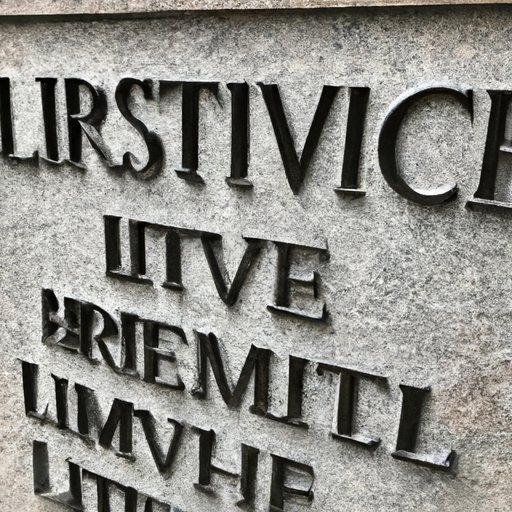Introduction
Abraham Lincoln is widely regarded as one of the greatest leaders in American history. He served as the 16th President of the United States from 1861 until his assassination in 1865. During his time in office, he successfully navigated the country through its most tumultuous period – the American Civil War. His leadership style was characterized by his determination to preserve the Union, his commitment to democratic reforms, and his unwavering support for civil liberties.
The question remains: why was Abraham Lincoln a great leader? This article will explore this question by examining his ability to unite a divided nation, his commitment to the preservation of democracy, his strength during wartime, his dedication to civil rights and social justice, and his effective communication skills.

Ability to Unite a Divided Nation
When Lincoln was elected president in 1860, the nation was on the brink of civil war. The southern states had threatened to secede from the Union if Lincoln was elected, and after his election seven of them did just that. Despite the immense pressure, Lincoln remained steadfast in his commitment to reuniting the Union.
“My paramount object in this struggle is to save the Union, and it is not either to save or to destroy slavery,” Lincoln said in 1862. “If I could save the Union without freeing any slave I would do it, and if I could save it by freeing all the slaves I would do it; and if I could save it by freeing some and leaving others alone I would also do that.” (1)
Lincoln’s primary strategy for reuniting the Union was compromise and negotiation. He recognized that there were powerful forces on both sides of the conflict, and he sought to find common ground between them. He offered a number of compromises, including the Corwin Amendment, which proposed to protect slavery in the states where it already existed. Ultimately, these efforts were unsuccessful, but they demonstrated his willingness to make concessions in order to achieve a greater goal.
Commitment to the Preservation of Democracy
In addition to his dedication to reuniting the Union, Lincoln was also committed to preserving the principles of democracy. He believed that political reforms were necessary in order to ensure that the country remained unified and true to its founding ideals.
One of the most important steps Lincoln took in this regard was issuing the Emancipation Proclamation in 1863. This document declared that all slaves in the Confederate states were free, and it was an important milestone in the fight for civil rights in America. In his famous Gettysburg Address, Lincoln reaffirmed his commitment to democracy, stating, “that government of the people, by the people, for the people, shall not perish from the earth.” (2)
Strength During Wartime
Lincoln’s leadership during the Civil War was instrumental in ensuring the Union’s victory. He developed a series of decisive military strategies that enabled the Union army to gain the upper hand against the Confederacy. He also provided strong political and moral support to the Union cause, which helped to bolster morale and keep the soldiers fighting despite the difficult circumstances.
Perhaps most importantly, Lincoln was determined to see the war through to the end. He refused to accept a negotiated peace with the Confederacy, believing that it would undermine the Union’s victory and leave the country divided. His unwavering commitment to the cause was an inspiration to the Union troops and a major factor in the Union’s eventual victory.

Dedication to Civil Rights and Social Justice
Lincoln’s commitment to civil rights and social justice was evident even before he became president. As a member of the Illinois legislature, he had consistently voted against measures that would have restricted the rights of African Americans. As president, he was determined to bring an end to slavery and promote racial equality.
In addition to issuing the Emancipation Proclamation, Lincoln also supported the passage of the 13th Amendment, which abolished slavery throughout the United States. He also worked to ensure that African Americans were given the right to vote and hold public office. Throughout his presidency, he advocated for equal rights for all citizens and worked to end discrimination based on race, religion, or ethnicity.
Effective Communication Skills
Finally, Lincoln was known for his effective communication skills. He was able to connect with people from all walks of life and inspire them to action. He was also an accomplished orator, delivering speeches that moved the nation and shaped public opinion.
His most famous speech was the Gettysburg Address, delivered in 1863 at the dedication of the National Cemetery in Gettysburg, Pennsylvania. In this address, Lincoln eloquently expressed the nation’s need to remember those who had died in the war and recommit itself to the cause of freedom and democracy. The speech is considered to be one of the finest examples of political rhetoric in American history.
Conclusion
Abraham Lincoln was a great leader because of his commitment to reuniting the Union, his dedication to the preservation of democracy, his strength during wartime, his dedication to civil rights and social justice, and his effective communication skills. He was an inspirational figure who left a lasting legacy on the nation and the world. His example serves as an inspiration to modern leaders and offers valuable lessons on how to lead with integrity and courage.
(Note: Is this article not meeting your expectations? Do you have knowledge or insights to share? Unlock new opportunities and expand your reach by joining our authors team. Click Registration to join us and share your expertise with our readers.)
